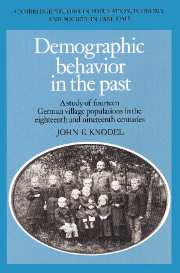 Demographic Behavior in the Past
Demographic Behavior in the Past Book contents
- Frontmatter
- Contents
- List of tables
- List of figures
- Acknowledgements
- PART I INTRODUCTION
- PART II MORTALITY
- PART III FAMILY FORMATION
- 6 Marriage
- 7 Marital dissolution and remarriage
- 8 Illegitimacy
- 9 Bridal pregnancy and prenuptial births
- PART IV MARITAL REPRODUCTION
- PART V INTERRELATIONSHIPS IN DEMOGRAPHIC BEHAVIOR
- PART VI CONCLUSION
- Appendices
- Bibliography
- Index
- Frontmatter
- Contents
- List of tables
- List of figures
- Acknowledgements
- PART I INTRODUCTION
- PART II MORTALITY
- PART III FAMILY FORMATION
- 6 Marriage
- 7 Marital dissolution and remarriage
- 8 Illegitimacy
- 9 Bridal pregnancy and prenuptial births
- PART IV MARITAL REPRODUCTION
- PART V INTERRELATIONSHIPS IN DEMOGRAPHIC BEHAVIOR
- PART VI CONCLUSION
- Appendices
- Bibliography
- Index
Summary
Given that reproductive activity is generally normatively sanctioned only within marital unions, nuptiality patterns can have important consequences for moderating population growth. This was recognized as such by Malthus, who placed a central importance on marriage as a ‘preventive check.’ The extent to which delayed and foregone marriage actually contains population growth depends also on the extent that reproductive activity is restricted to marital unions. Thus the level of out-of-wedlock childbearing, and the extent and nature of its links to marriage, are important aspects of the system regulating the formation of reproductive unions within a population. The four chapters constituting this section on family formation examine nuptiality and non-marital reproductive activity as exemplified by the German village populations under study.
On the broadest level of comparison, the most distinguishing feature of demographic behavior in western Europe during the eighteenth and nineteenth centuries was a system of family formation characterized by relatively late entry into marriage for both sexes and significant proportions never marrying. The outlines and implications of this very unusual, perhaps unique, marriage pattern that characterized Europe in the past have been described in an influential essay by Hajnal. Considerable evidence has accumulated since the essay's publication to confirm the general picture of a pattern of late marriage and substantial celibacy persisting for at least several centuries and extending into at least the initial decades of the twentieth century.
- Type
- Chapter
- Information
- Demographic Behavior in the PastA Study of Fourteen German Village Populations in the Eighteenth and Nineteenth Centuries, pp. 119 - 152Publisher: Cambridge University PressPrint publication year: 1988
- 1
- Cited by
